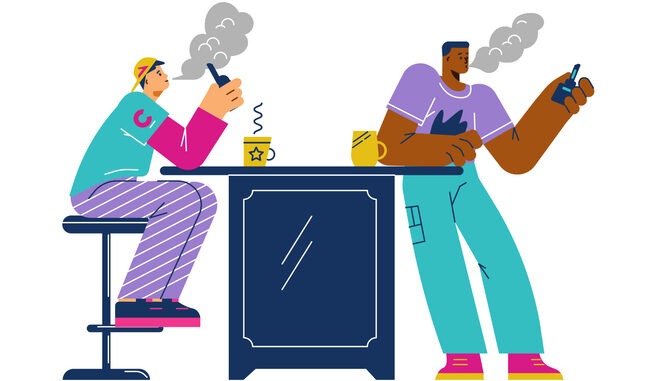
It is feared the e-cigarette boom will create a generation of young people addicted to nicotine
CREDIT: This is an edited version of an article that originally appeared in the Guardian
Despite it being illegal to sell vaping devices to under-18s, research indicates a steep rise in underage vaping over the last five years.
Lindsey Smith’s son was 14 when he bought his first vape and she is one of the many parents, across the UK, alarmed at how vaping has quietly gained popularity – with seemingly few warnings from health officials or the government.
Child respiratory doctors have criticised the government for not cracking down on further issues, such as child-friendly packaging and names, including ‘Banana Milkshake’ and ‘Jelly Babies’; both products contain 2% nicotine, the highest concentration allowed in the UK. “I am concerned that we are sleepwalking into a public health catastrophe with a generation of children hooked on nicotine,” said consultant paediatric chest physician at the Royal Brompton and Harefield hospitals, Professor Andrew Bush.
For years vapes have been promoted by ministers because ‘they carry a fraction of the risk of smoking’ and could help combat the 78,000 people killed each year in the UK by smoking – the feeling is that the devices should only be a ‘quit’, tool, not a ‘cool’ tool. The Observer recently revealed that Elf Bar, one of the leading brands of disposable vapes, was flouting rules to promote its products to young people on social media app, TikTok.
There are concerns about the long-term health effects of vaping because, while e-cigarettes are considered a significantly safer alternative to tobacco, they are still potentially dangerous to health – for example, a report published in the American Journal of Preventive Medicine found e-cigarette use significantly increased a person’s risk of developing lung diseases such as asthma, bronchitis and emphysema
Barnardo’s chief executive Javed Khan recently spoke on the government’s ambition to make England smoke-free by 2030. He said vaping would help reduce smoking, but the government should do “everything they possibly can” to prevent young people from vaping.
A Department of Health and Social Care spokesperson commented that the UK had “…some of the strongest regulations in place on vapes to protect children and young people. We are clear that vaping should only be used to help people quit smoking – vapes should not be used by children, young people or non-smokers.”


Be the first to comment